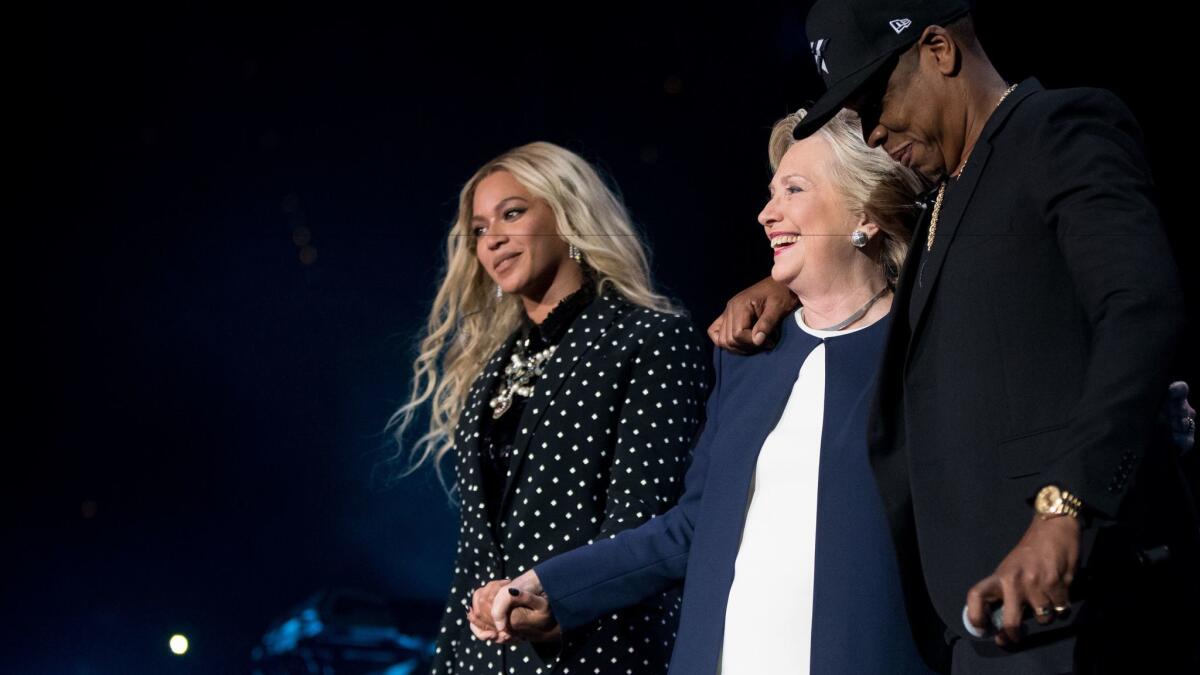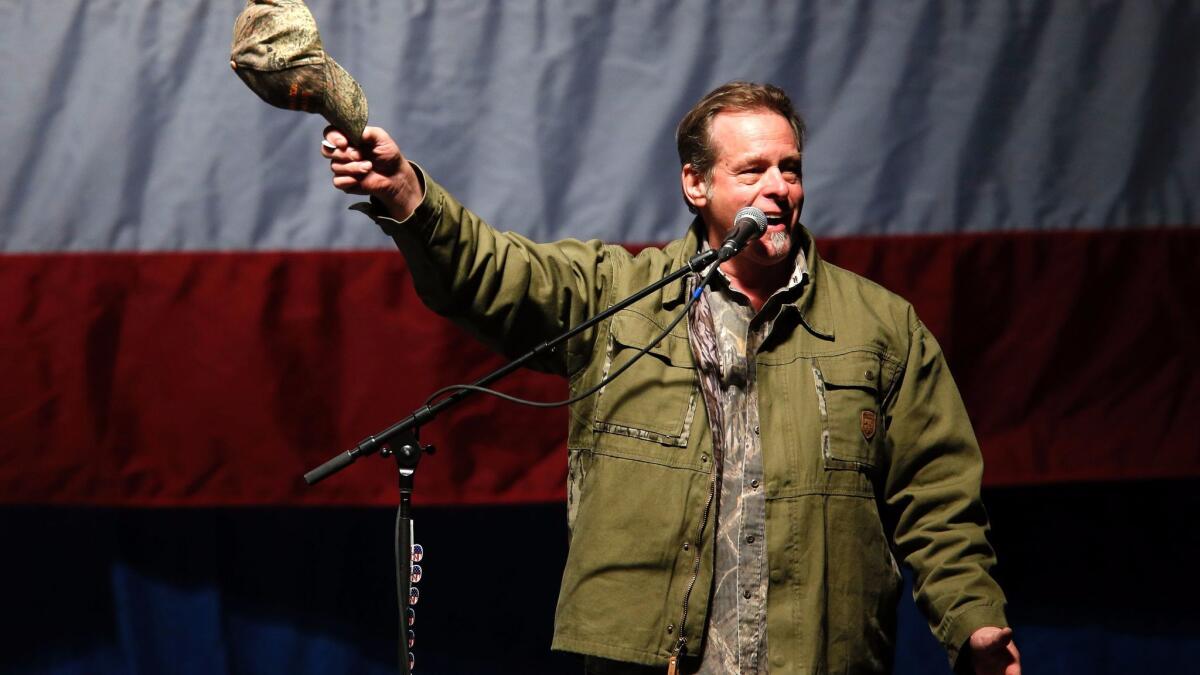Hillary Clinton sees last-minute surge of support — from some of pop music’s biggest stars

- Share via
Until recent weeks, the rancor of this year’s contest between Democratic presidential nominee Hillary Clinton and the Republicans’ Donald Trump had left many pop artists relatively muted.
But in the final days of the campaign, a wave of acts have at long last found their voices — many in favor of the Democrats’ candidate.
Bruce Springsteen, a liberal stalwart who performed at the inauguration for President Obama, sang this past weekend in support of Clinton. Pop heavyweights Beyoncé and Jay Z joined Clinton in Cleveland, and on the eve of the election, artists such as Lady Gaga and Jon Bon Jovi had Monday evening rallies planned to support the Democratic nominee .
Even some not known for being politically active have begun speaking out.
Last Thursday, for instance, Pharrell Williams took the stage in Raleigh, N.C., to express his support for Clinton.
“I’ve got to be honest with you guys, I feel a little odd because this is a political rally, it’s my first time doing something like this,” Williams said. “I’m a musician, politics is not my field of expertise”
Yet from Harry Belafonte, Nina Simone and Sam Cooke during the Civil Rights era through the jubilant gospel, R&B and hip-hop artists who greeted Obama’s inauguration, music has played a pivotal role in setting the tone of presidential campaigns. Obama’s Spotify playlists, which range from classic rock to contemporary soul, have even been huge hits among his fans.
See the most-read stories in Entertainment this hour >> »
But until recently, this year felt different.
“Be it apathy or confusion or such a polarizing election, Hillary got caught in the crossfire,” suggested Ben Harper, the musician and activist who has worked phone banks and made live appearances with the Clinton campaign.
Harper has long been active in issues around climate change and poverty. But in the last month, he said he saw the necessity of advocating more directly for Clinton.
“I had a conversation with my mother about her and all of Trump’s sexism and abuse of women, and I saw I personally wasn’t doing enough. So I called them in September and said, ‘I’ll go wherever you’ll send me.’”
Compared with Obama’s 2008 run, this year’s election had been relatively quiet on the music-activism front. Blame it on the often singularly depressing tone; blame it on the thwarted energy that many musicians — Killer Mike, Vampire Weekend — put into Bernie Sanders’ campaign. Many had been focused on particular issues like racialized police violence instead of a more general campaign message.
“Artists have been consistently engaged on the issues at stake, from criminal justice and policing, to the environment and gender equality,” said Jesse Moore, Rock the Vote’s vice president of civic engagement.
“Beyoncé,” Moore added, ”has been speaking passionately on critically important issues from the stage and online, and as the election drew near, she added Rock the Vote’s voter engagement tool to her social channels to help her voters direct their energy in a positive and specific way.”

On the right, the few usual Republican-friendly rockers like Kid Rock and Blake Shelton have been relatively laconic in their support (save for right-wing stalwart Ted Nugent, who performed at a Trump rally)
Trump did earn unexpected, if muted, approval from rapper Azealia Banks, Vegas lounge staple Wayne Newton and country veteran Loretta Lynn. But by and large, most Republican-leaning musicians have stayed away from the Trump campaign trail. George W. Bush, by contrast, attracted overt support from country stars like Brooks & Dunn and Ricky Skaggs.
Some major pop stars like Taylor Swift and Justin Bieber have chosen to avoid the fray entirely (Bieber has the added excuse of being Canadian). In such a contentious election, speaking out for one side could be even more risky for artists.
“I’m an entertainer, and you have to wield that (position) cautiously,” Harper said. “You don’t want to browbeat people.”
However, in the last stretch of the election, nearly every corner of pop music has found something to say — much of it pro-Clinton. Their sudden sprint toward advocacy might be a jolt of energy in the final push of the campaign. On Monday, Madonna announced a small Brooklyn concert to encourage Clinton supporters, adding in an Instagram post: “If Trump were elected we would be at war in no time at all.” Lady Gaga planned a similar show with Bill Clinton and Jon Bon Jovi in Raleigh.
The biggest election-themed concerts — a mini-festival of events featuring Jay Z, Beyoncé, Bon Jovi, Katy Perry, Steve Aoki and others — hit Cleveland and Philadelphia in the homestretch. Titled “Love Trumps Hate,” the shows were unambiguous in their message. (Trump, for his part, seemed irked by the concerts, saying “Isn’t it amazing that when Jay Z and Beyoncé use the filthy language they use in the songs — using words that if I ever said those words, it would be the reinstitution of the electric chair, right?”)
Perhaps the most pointed political song of this stretch came from Compton rapper YG, whose bass-rattling single “FDT” is an abbreviation expressing his extreme displeasure with Donald Trump. Across L.A., in clubs and bars and even at other concerts, the song has been an unsubtle way for music fans to express anti-Trump solidarity while still soundtracking a party. Eminem released his own anti-Trump song, “Campaign Speech,” last month.
That sentiment has been widespread across the genre. Last month, before his New York get-out-the-vote rally with the Preservation Hall Jazz Band and the Blind Boys of Alabama, Win Butler of the Arcade Fire called Trump “a complete … nightmare and a joke.”
Then there’s the “30 Days, 30 Songs” project, spearheaded by author Dave Eggers, focused on releasing new politically inspired music from anti-Trump (and pro-Clinton) artists like Death Cab for Cutie and R.E.M., all advocating for a “Trump-free America.”
“It’s different than in 2008 when there was a grand sweep of change and hope. We knew musicians wanted to get involved, but maybe they just didn’t know the way in,” said Jordan Kurland, the music manager and co-founder with Eggers of the “30 Days, 30 Songs” project.
“The fear was that this election was so crazy that it just turned people off. But this shows that musicians can have an impact, and our hope is that the people we get involved now will get in even earlier next time.”
Chance the Rapper, in the run-up to a Chicago get-out-the-vote rally, said in a statement that “This election is very important, a chance for new leaders and new opportunities to emerge.” He promised to personally hit the pavement and lead young voters to the polls.
The rapper Pusha T made a cameo in a campaign video with Clinton’s vice presidential running-mate (and fellow Virginian) Tim Kaine. “My biggest concern is the criminal justice system. We’re definitely on the same page in regards to knowing that it’s flawed and needs to be fixed,” the rapper said. Also in Virginia, Miley Cyrus hit the pavement at George Mason University to rally students for Clinton.
Even Adele — who is English — vouched for Hillary at a Miami concert, saying “I am 100% for Hillary Clinton. I love her, she’s amazing.” Clinton was in the audience when the most powerful commercial force in pop music made her endorsement.
In the campaign’s final hours, Springsteen performed at a Clinton rally in Philadelphia, in a moving and valedictory set that aimed to appeal to blue-collar rock fans.
But perhaps the most subtle, telling alliance came at this year’s Country Music Awards, which is about the most neutral territory for Trump supporters that the music business could offer.
There, after some gentle Trump and Clinton ribbing from hosts Brad Paisley and Carrie Underwood, Beyoncé performed “Daddy Lessons” with the Dixie Chicks, a duet between the famously anti-war trio and Black Lives Matter-supporting pop titan. The twangy, acoustic-driven song, which appeared on Beyoncé’s album ”Lemonade,” evokes the African and African American roots behind much country music.
They stayed on-message in the performance, but the implication was clear. Across genre and across geography, in the waning days of the campaign, pop artists were generally aligned in their beliefs.
“If music doesn’t have the power to communicate and encourage social progress, then I should just put my guitar down,” said Harper.
For breaking music news, follow @augustbrown on Twitter.
ALSO
Tom Morello on why activism in music matters: ‘Dangerous times demand dangerous songs’
Politics and pop music: Will frequent adversaries ever come together?
More to Read
The biggest entertainment stories
Get our big stories about Hollywood, film, television, music, arts, culture and more right in your inbox as soon as they publish.
You may occasionally receive promotional content from the Los Angeles Times.











